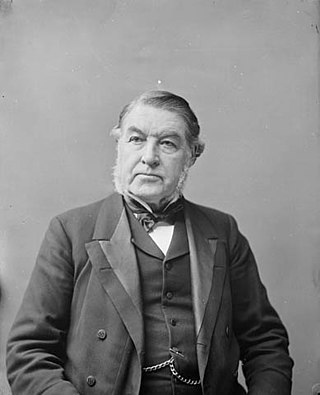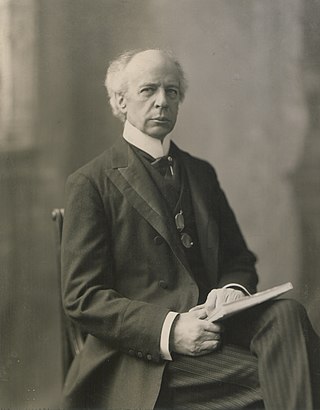Related Research Articles

Sir Charles Tupper, 1st Baronet,, M.D. was a Canadian Father of Confederation who served as the sixth prime minister of Canada from May 1 to July 8, 1896. As the premier of Nova Scotia from 1864 to 1867, he led Nova Scotia into Confederation. He briefly served as the Canadian prime minister, from seven days after parliament had been dissolved, until he resigned on July 8, 1896 following his party's loss in the 1896 Canadian federal election. He is the only medical doctor to have ever held the office of prime minister of Canada and his 68-day tenure as prime minister is the shortest in Canadian history.

1797 (MDCCXCVII) was a common year starting on Sunday of the Gregorian calendar and a common year starting on Thursday of the Julian calendar, the 1797th year of the Common Era (CE) and Anno Domini (AD) designations, the 797th year of the 2nd millennium, the 97th year of the 18th century, and the 8th year of the 1790s decade. As of the start of 1797, the Gregorian calendar was 11 days ahead of the Julian calendar, which remained in localized use until 1923.

Events from the year 1870 in Canada.

The Postmaster General of Canada was the Canadian cabinet minister responsible for the Post Office Department. In 1851, management of the post office was transferred from Britain to the provincial governments of the Province of Canada, New Brunswick, Newfoundland, Nova Scotia and Prince Edward Island. The position of Postmaster General was established in each province. With Canadian Confederation in 1867, a single position was created replacing this post in all of the above provinces except Newfoundland; this position was abolished in 1981 when the post office was transformed from a government department into a crown corporation. Since 1981 Canada Post has been led by a President and CEO. From 1900 until 1909 the Postmaster General was also responsible for the Department of Labour. It now reports to the Minister of Public Services and Procurement.

The 3rd Canadian Parliament was in session from March 26, 1874, until August 17, 1878. The membership was set by the 1874 federal election on January 22, 1874. It was dissolved prior to the 1878 election.

The Keeper of the Privy Purse and Treasurer to the King/Queen is responsible for the financial management of the Royal Household of the Sovereign of the United Kingdom. The officeholder is assisted by the Deputy Treasurer to the King/Queen for the management of the Sovereign Grant, currently Sally O'Neill.
More than 1,500 African American officeholders served during the Reconstruction era (1865–1877) and in the years after Reconstruction before white supremacy, disenfranchisement, and the Democratic Party fully reasserted control in Southern states. Historian Canter Brown Jr. noted that in some states, such as Florida, the highest number of African Americans were elected or appointed to offices after the end of Reconstruction in 1877. The following is a partial list of notable African American officeholders from the end of the Civil War until before 1900. Dates listed are the year that a term states or the range of years served if multiple terms.

The First Canadian Ministry was the first cabinet chaired by Prime Minister John A. Macdonald. It governed Canada from 1 July 1867 to 5 November 1873, including all of the 1st Canadian Parliament as well as the first eight months of the Second. The government was formed by the Liberal-Conservative Party in coalition with the old Conservative Party of Canada. Macdonald was also Prime Minister in the Third Canadian Ministry.

The Second Canadian Ministry was the cabinet chaired by Prime Minister Alexander Mackenzie. It governed Canada from 7 November 1873 to 8 October 1878, including the last two months of the 2nd Canadian Parliament as well as all of the 3rd. The government was formed by the Liberal Party of Canada.

The Third Canadian Ministry was the second cabinet chaired by Prime Minister John A. Macdonald. It governed Canada from 17 October 1878 to 6 June 1891, including the 4th, 5th, and 6th Canadian Parliaments, as well as the first three months of the 7th. The government was formed by the Liberal-Conservative Party in coalition with the old Conservative Party of Canada. Macdonald was also Prime Minister in the First Canadian Ministry.

The Eighth Canadian Ministry was the cabinet chaired by Prime Minister Sir Wilfrid Laurier. It governed Canada from 11 July 1896 to 5 October 1911, including all of the 8th, 9th, 10th, and 11th Canadian Parliaments. The government was formed by the Liberal Party of Canada.
References
- "King's Privy Council for Canada - Canada.ca". Privy Council Office.
- "Parliamentarians sworn in as members of the Queen's Privy Council for Canada". Parliament of Canada. Retrieved February 22, 2012.}